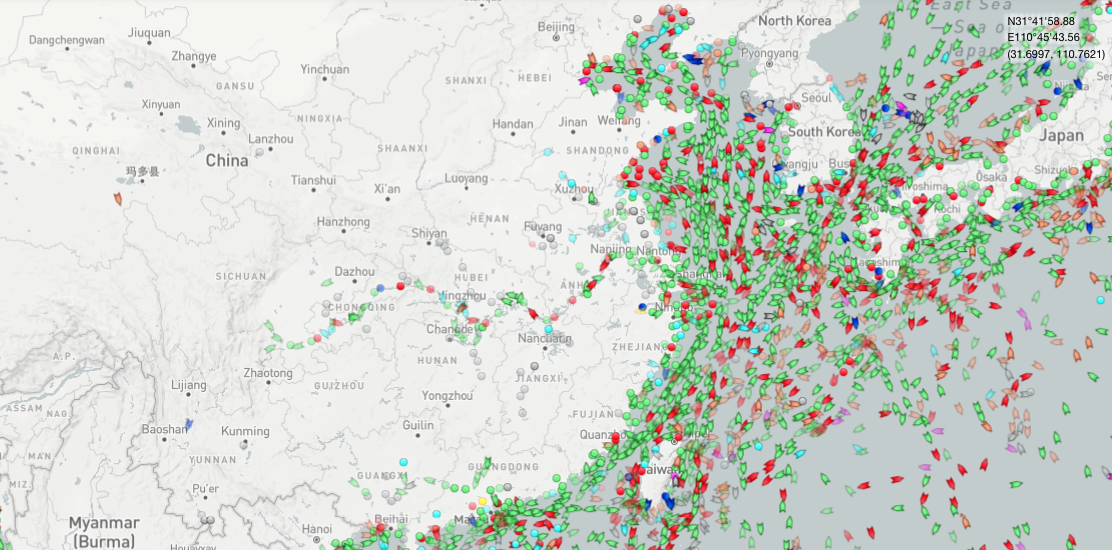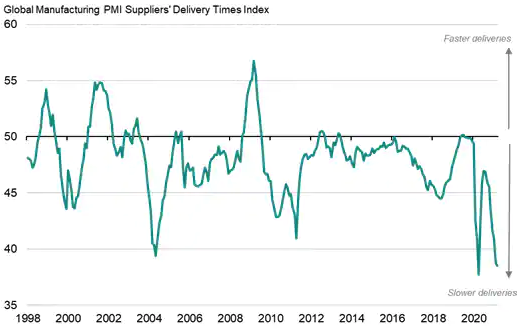Will the global supply chain crisis be transitory?
From containerloads of cars to construction materials and home furnishings, the global supply chain crisis has shown no signs of abating. As recently as January, the Port of Los Angeles had more than a hundred ships waiting at its doors without service because the authority admitted it couldn't find the staff to run a 24-hour operation. That number has since alleviated, only to be replaced by China's coronavirus lockdown and war in Ukraine making the execution of international trade just that bit more difficult.
Speaking of China, which accounts for about 12% of global trade, COVID restrictions have idled factories and warehouses, slowed truck deliveries, and exacerbated container logjams. Even as Shanghai slowly reopens, the backlog is startling, as this image from Marine Traffic shows.

What evidence do we have that supply chains are on the mend - or indeed, is this something that will take more time and policy to solve? In the second of our three-part collection on all things supply chains, we consider the factors that may help alleviate this global crisis - and more importantly, those that hinder its resolution.
Demand will be transitory but will disruptions be as much?
Francyne Mu, portfolio manager, Franklin Templeton
There are both structural and transitory factors causing the current disruption. We believe the most structural disruption is related to companies’ strategies relating to their supply chains overall.
Pre-COVID, operations managers assumed a relatively high degree of reliability across the global supply chain. Both COVID and the war between Russia and Ukraine have demonstrated that this can no longer be taken for granted. Strategic changes in company supply chains will likely occur on a longer-term time scale and its impacts will be felt as companies restructure and reposition their manufacturing plants/suppliers.
The more immediate question is whether the COVID-related supply-chain disruptions can be resolved quickly and harmonised with a softening global economy and tight commodity markets.
The heightened demand for goods and services related to the ongoing re-opening of economies is likely to be transitory and will moderate over the coming year, especially as central banks globally have embarked on a program of interest rate increases.
Global labour supply availability and the impact on inbound and outbound logistics may be temporary, but clearly dependent upon the evolution of the virus in the coming winter season and specific government responses to COVID outbreaks.
The situation today in China is a case in point. The Chinese government’s decision to maintain its zero-COVID policy has resulted in ongoing global supply chain disruption, and this may continue depending on the efficacy of the policy given a higher unvaccinated population, the virus mutation path, and the Chinese government’s ongoing willingness to endure the economic hardships associated with the policy itself.
Where there have been opportunities, companies have responded to these disruptions by diversifying their supply chains globally, with intentions to broaden their manufacturing base or suppliers across many different geographies.
We are cautiously optimistic that the combination of more flexible responses (closed-looped working environments, less virulent viruses, reduced isolation requirements), the ongoing diversification in global supply chains, greater participation of the labour force, and moderating demand, can create an environment where the supply chain returns to a relative level of stability.
Why troubles could lead to higher interest rates
Vince Pezzullo, deputy head of equities, Perpetual Asset Management Australia
We think there are elements of both. The problems associated with COVID itself will eventually be overcome as the disease becomes endemic and life mostly returns to normal. While prices may stay higher for a period, eventually most of the price hikes related to temporary supply dislocations should compete away again. But we feel that the challenges associated with de-globalisation and geopolitical factors are:
- more structural in nature
- more difficult to address, and
- could lead to permanent changes in supply chains.
In fact, more broadly, we think these structural changes, and other factors such as decarbonisation (which will drive costs higher in the medium term) and ageing populations (where the ageing population consumes more than it produces and saves), could result in more sustained inflation in years to come. This in turn could trigger higher interest rates and increase the cost of capital.
Supply chains are meeting their ESG moment
Bill Pridham, portfolio manager, Ellerston Capital
Corporate commitments being made today require critical investment in supply chains. A significant challenge for brands committing to circular economy initiatives is product and material traceability. A key requirement of circularity is to identify the origin of post-consumer recycled products and their raw material composition. Without this, the new use cases for these materials become significantly limited.
Corporates are also seeing increased scrutiny of their supply chains. Consumers want to know where their products came from and who made them.
For instance, ASOS announced its Be Transparent initiative which is working towards full public transparency of every own-brand product by 2030. ASOS plan to show this information on their platform so consumers can use the information to inform their purchases.
In response to the pandemic, companies are being forced to look closely at their supply chains and assess the risks throughout. Ultimately, this will increase the need for traceability services and inform future supply chain investment.
Are we in a "re-globalisation" phase?
Ben Li, equity analyst and portfolio manager Fidelity International
Not for the first time, pundits are saying the current challenges mark the death of globalisation. We think this misses the mark.
Based on what Fidelity’s global network of analysts is seeing on the ground - especially around the manufacturing hubs of Asia - globalisation is very much alive and well, if in a state of rapid change. While the near-term fallout is evident, we see companies emerging from the current crunch with revamped better-diversified supplier networks that, in the long run, will only make them more resilient to external shocks.
This, in effect, is what we mean by re-globalising.
Where to from here
Whether you believe supply chain disruptions are transitory or structural, it's safe to say that the impact has been incredible in the data. The best way to look at this is the IHS Markit suppliers' delivery times index which helps gauge the degree to which the current demand/supply environment is indicative of either a buyers' or sellers' market.
A reading below 50 demonstrates supply chain difficulties - and it's clear that they've been hanging around for some time (at least in this survey).

Depending on the extent of these lockdowns in China and the backlog in Los Angeles among other ports, it may take a while for that 50 reading to re-print itself.
Never miss an insight
If you're not an existing Livewire subscriber you can sign up to get free access to investment ideas and strategies from Australia's leading investors.
In case you missed it, part one of this series written by Glenn Freeman is already up on the website: (VIEW LINK). Stay tuned for part three from Glenn, looking at the traits of companies who have been able to weather these disruptions so far.
3 topics
6 contributors mentioned

